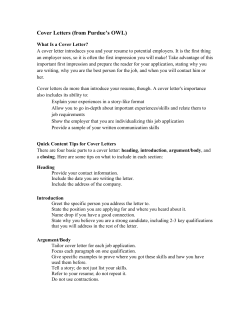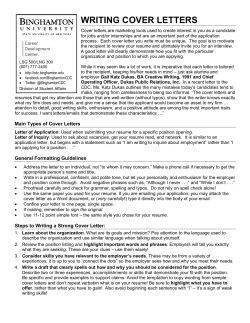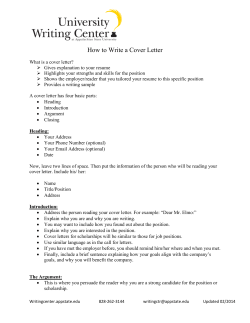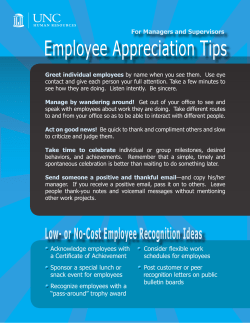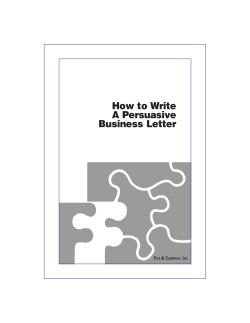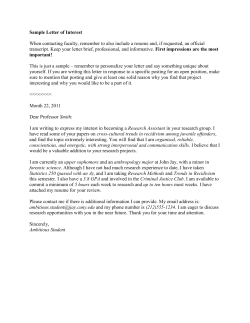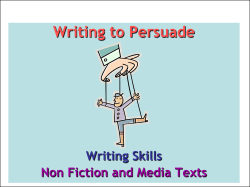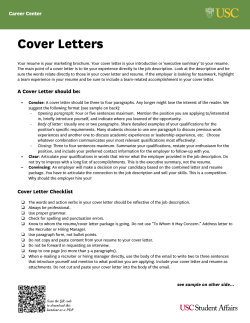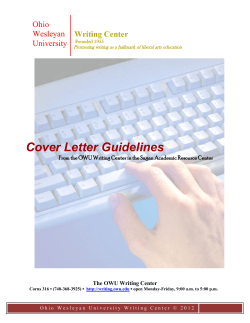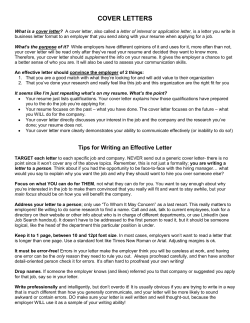
The Art of Writing Job-Search Letters
The Art of Writing Job-Search Letters By William J. Banis Perhaps one of the most confusing aspects of finding a job that you’ll face is writing appropriate jobsearch letters. The job search may be the first time you’ll have to compose and produce professional-level correspondence. Accordingly, you face the challenge of deciding both what to say and how to say it for a number of important, unfamiliar situations, such as applying for positions, showing appreciation, and accepting or rejecting offers. Because there is no single formula or model letter that will work well for every occasion you should give as much careful consideration and attention to detail to your letter writing as you do to other career planning and job-search activities. This article introduces you to the art of writing job-search correspondence. It provides a context for letter writing, suggestions for writing style general guidelines for producing high-quality letters, and samples of several types of letters. The information applies to both paper (hard copy) and e-mail letters. Job-search letters in context Letters can enhance your employability, but they must be connected to your most important jobsearch tool – your brain! The purposes and impact of every letter should be considered carefully. Generic, impersonal letters simply don’t work. It’s important that you craft your letters to reflect what is appropriate for your audience, your objectives, and the requirements of the situation. Job-search letters shouldn’t be written in a vacuum. Effective letters are only one component in a larger system of interrelated tasks and activities designed to advance your career. Ideally, your letters should flow from, and be linked to, the following career development tasks: • Assessing your abilities, skills, knowledge, interests, preferences, values, and motivations; • Researching and evaluating occupations, jobs, and employers; • Defining your work objectives and career goals; • Writing a professional-level resume; • Planning and implementing your job-search campaign; • Interviewing for job opportunities; and • Choosing appropriate work. Most often, letter writing supports the last three tasks, but the key point to remember is that effective letters are part of a larger career planning and job-search process. If you’re struggling unduly with your written communications, perhaps you need to do more foundational work in clarifying your career direction and articulating your value to employers. Writing style As an act of communication, your letters say something important about you as a professional and as a prospective employee. To create a positive impact, analyze your “audience” by considering his or her problems and requirements, then plan your letters accordingly. Audience analysis is a process of introspection by which you put yourself in the reader’s situation in order to understand his or her needs and problems. After such analysis, you can then compose your letters to show how your background and talents can meet the reader’s needs; convince the reader of your value as a prospective employee; and persuade the reader to take action in your favor. A key point to remember is that responsibility for effective communication rests with the writer, not with the reader. Seasoned business writers tend to follow these basic principles: • • • • • • • • • • Decide your purpose in writing, then plan accordingly. Place the most important items first, supported by facts. Group similar items together in a paragraph, then organize the paragraph in logical relationship to the other. Do the work of organizing your information for the reader. Keep your letters personal, warm, and professional. Avoid being either overly familiar or overly officious in tone. However, do remember that business letters are formal, not informal documents. Say what you mean directly without a lot of verbiage. Demonstrate that you understand the value of the reader’s time by being as brief as possible. Write clearly and simply. Avoid jargon and overly complex sentences. Be positive in content, tone, word choice, and expectations. Suggest that you are an optimistic, responsible, productive, and reasonable person. Use active voice and action verbs in your writing. Keep the reader’s interest by varying sentence structure and length. Reduce uncertainty and abstraction for the reader by including specific facts. Provide information that reflects the reader’s interest. Stress benefits for the reader. By following these guidelines, you should be able to improve the clarity and positive impact of your messages. These guidelines apply to both paper letters and e-mail correspondence. Types of letters Communication skills are critically important in your career, and your job-search letters usually will be one of the first samples employers will have of your competency in this area. Your letters should be functional, understandable, easy to read, and pleasant in tone. Remember: Every communication act is a message about you. There are seven basic letters you will probably use during your job search: • Application • Prospecting • Networking • Thank-you • Acceptance • Withdrawal • Rejection Each has its own function and should be used accordingly. Descriptions of the seven types of letters follow, and illustrations are provided for each. Be sure to sign the original hard copy letters and to keep copies of all your paper and electronic correspondence. 1. Application Letter – The purposes of this letter are to get your attached resume read and to generate interviews. Use this type of letter in response to specific job advertisements and vacancy announcements. Your strategy is to demonstrate that your qualifications fit the requirements of the position. Study the position description carefully and decide on one or more themes – education, experience, interests, responsibility, etc. – that show persuasively how well you fit the position. Link major job dimensions with your related past performance and experience. 2. Prospecting Letter – The purposes of this letter are to prospect for possible vacancies in your occupation, get your resume read, and generate interviews. Prospecting letters are used extensively for longdistance searches. Target specific individuals in specific organizations. Structure this letter similarly to the application letter, but instead of using specific position information, focus on broader occupational and/or organizational dimensions to describe how your qualifications match the work environment. 3. Networking Letter – This letter is designed to generate information interviews – not job interviews – which allow you to meet individuals who can give you specific information about your intended career. Your purposes in seeking information interviews may vary, but your reasons for wanting to meet with a contact person must be genuine and sincere. Information interviewing, or “networking,” has been tainted in recent years by job seekers who misuse this approach, but it remains a viable way to conduct job market research, refine career goals, and uncover vacancy information in an industry or a geographical region. Information interviewing isn’t a magic shortcut to employment; it requires solid preparation, sincerity, and much effort. The networking letter is the first step in the information interviewing process. Normally, a resume is not attached to a networking letter, but it may be presented during the interview itself to help the interviewer address your questions. 4. Thank-you Letter – This is one of the most important yet least used tools in a job search. It is used to establish goodwill, express appreciation, and/or strengthen your candidacy. The basic rule of thumb is that everyone who helps you in any way gets a thank-you letter. When used to follow up on employment interviews, thank-you letters should be sent within 24 hours to everyone who interviewed you. If it is not possible or appropriate to send a thank-you letter to everyone you met during the interview, then send a thank-you letter to your host or to the highest ranking manager you met with a request to extend your appreciation to the entire group. Also, be sure to send thank-you letters to each of your contacts who granted you information interviews and to people who provided references for you. 5. Acceptance Letter – Use this letter to accept a job offer, to confirm the terms of your employment (salary, starting date, medical examinations, etc.), and to positively reinforce the employer’s decision to hire you. Most often, an acceptance letter follows a telephone conversation, during which the details of the offer and the terms of employment are discussed. 6. Withdrawal Letter – Once you accept a position, you have an ethical obligation to inform all other employers of your decision and to withdraw your employment application from consideration. Your withdrawal letter should express appreciation for the employer’s consideration and courtesy. It may be appropriate to state that your decision to go with another organization was based on having better person/job fit for this stage in your career. DO NOT say that you obtained a better job. 7. Rejection Letter – Employers aren’t the only ones to send rejection letters. Candidates may have to decline employment offers that do not fit their career objectives and interests. Rejecting an employment offer should be done thoughtfully. Indicate that you have carefully considered the offer and have decided not to accept it. Also, be sure to thank the employer for the offer and for consideration of you as a candidate. Closing thoughts Finally, please remember that you and your situation are unique. Strive to allow your individuality to be expressed through your writing. With a little practice, you will develop lifelong business writing skills that will support and enhance your career. Good luck! This article can be found in Job Choices for Science, Engineering, & Technology Students: 2004. Tips for writing and producing job-search correspondence To a large extent, securing an appropriate position is a challenge in communicating effectively. Jobsearch letters should reflect sound writing practices and promote your candidacy. You must communicate your value to a prospective employer in an understandable, brief, and positive way. The following guidelines should help you achieve those goals: • Design your letters to be work-centered and employer-centered, not self-centered. Your letters are marketing tools that should address the needs of employers and evoke a desire to learn more about you. • Never delegate responsibility for your job search to anyone else. Do all the writing yourself, and take responsibility for following up with employers. • Always address your letters to a specific individual with his or her correct title and business address. • Use high-quality stationery and envelopes for your hard copy letters. • Keep the letter to one page. Eliminate extraneous words and avoid rehashing material from your resume. • Produce error-free, clean copy. • Tailor your letters for each situation. Generic, mass produced letters are ineffective. • Show appreciation to the employer for considering your application, for granting you an interview, and so forth. • Always keep your reader in mind. Make your letters easy to read and attractive. • Be timely. Demonstrate that you know how to do business for yourself and, by implication, for others. • Be honest. Always be able to back up your claims with evidence and specific examples from your experience. When reflected in your writing, these job-search guidelines should communicate that you are a responsible person with a positive attitude who knows how to operate in a professional environment. Sample 1 Structure your application letters with three or four paragraphs: Come to the point. Reveal your purpose and interest. Identify the position and your source of information. Introduce your themes. Outline your strongest qualifications that match the position requirements based on the themes you selected. As much as possible, provide evidence of your related experiences and accomplishments. Make reference to your enclosed resume. Suggest an action plan. Request an interview, and indicate that you will call during a specific time period to discuss interview possibilities. 1225 Chicago Ave. Evanston, IL 60208 March 14, 2004 Application Letter Ms. Mary Lou Nelson Manager of Human Resources Continental Industries, Inc. 2900 Rosemont Blvd. Rosemont, IL 60018 (Full Block Format) Dear Ms. Nelson: I am applying for the web developer position that was advertised with Northwestern University CareerServices this week. The position seems to fit very well with my education, experience, and career interests. Your position requires skills in various types of programming and software used in web development. My academic program in computer studies emphasized C, C++, Visual Basic, Assembler, Java, and SQL. In addition, I have extensive experience in using several software packages in web development, including Adobe Illustrator, Photoshop, After Effects, and Dreamweaver. My experience as a department computer consultant gave me exposure to both PC (Windows2000, NT, XP) and Macintosh platforms as well as Novell and NT LANs. Additionally, I worked as a summer intern in computing operations for a major city newspaper where I gained knowledge of enterprise systems and e-commerce operations. My enclosed resume provides more detail to my qualifications. My background and career goals seem to match your job requirements well. I am confident that I can perform the job effectively. Furthermore, I am genuinely interested in the position and in working for Continental Industries, Inc. Your firm has an excellent reputation and comes highly recommended to me. Would you please consider my request for a personal interview to discuss my qualifications and to learn more about this opportunity? I shall call you next week to see if a meeting can be arranged. Should you need to reach me, please feel free to contact me at 847/683-4388 or m-lopez@northwestern.edu. Thank you for your consideration. I look forward to talking with you. Express appreciation to the reader for his or her Sincerely yours, time and consideration. Maria Lopez Maria Lopez 1600 Sherman Ave. #301 Evanston, IL 60208 January 15, 2004 Sample 2 Prospecting Letter Mr. Brett Newkirk Director of College Recruiting Gray Construction Company 4500 Randolf Drive Chicago, IL 60601 (Full Block Format) Dear Mr. Newkirk: I read your company’s description in NACE’s Job Choices for Science, Engineering, & Technology Students and would like to inquire about employment opportunities in your civil engineering department. I want to work in civil engineering and would like to remain in the Chicago area after graduation. I shall receive my B.S. degree in civil engineering this May. My interest in engineering started in high school when I attended the Student Introduction to Engineering Program at North Carolina State University in my hometown. This interest further developed through a variety of construction jobs during college. My internship with a construction company in my hometown convinced me to pursue this field. When I researched the top construction firms in Chicago, Gray Construction emerged as having a strong market position, an excellent training program, and a solid reputation. In short, you provide the kind of professional environment I seek. Indicate your interest, and reveal your source of information. Outline your strongest qualifications –focus on broader occupational and/ or organizational dimensions to describe how your qualifications match the work environment. Do some personal marketing: Convince the employer that you have the personal qualities and motivation to contribute to the organization. Suggest an action plan. Request an interview, and indicate that you will call during a specific time period to discuss interview possibilities. I know you must have many demands on your time, but I would appreciate a few minutes My resume is enclosed for your consideration. My education and experience match the qualifications you seek, but they don’t tell the whole story. I know from supervisor feedback that I have the technical and interpersonal skills you seek. My relatively extensive experience gives me confidence in my career direction and in my abilities to perform competently. of your time. I shall call you during the week of January 24 to discuss employment possibilities. In the meantime, if you need to reach me, my number is 847/491-8843 and my e-mail is j-chen@northwestern.edu. Thank you very much for considering my request. I look forward to talking with you. Sincerely, John Chen John Chen Express appreciation to the reader for his or her time and consideration. Sample 3 Structure this letter along these lines: Make a connection between you and the reader – e.g., alumnus/alumna of your school, mutual acquaintance, similar interest or background, etc. Networking Letter (Modified Block Format) 543 Clark St. Washington, DC 20002 October 21, 2003 Jennifer Hundahl, M.S.N National Institute of Health 10 Center Drive Bethesda, MD 20893 Dear Ms. Hundahl: Dr. Charlene Carr, professor of nursing at City College, suggested that I contact you. She thought that, as an alumna, you would be in an excellent position to assist me with a career decision. State your purpose without pressuring the As a nursing student, I am exploring which career environment to pursue. Hospital, reader. Explain your physician’s office, and public health nursing environments all sound interesting to me at situation briefly. this point, but I want to go into my campus interviews next semester with a clear sense of direction. I would like to get your advice on the long-term career implications of each path. Request a meeting at a mutually convenient I shall call you next week to see if we can arrange a brief meeting at your convenience. time, and indicate that Thank you for considering my request. you will call to make Sincerely, arrangements. Allison Harris Allison Harris 2913 Baxter Rd. Sample 4 Virginia Beach, VA 23465 January 15, 2004 Thank-You Letter Dr. Foster Walker, Director Technical Design Group Atlantic Engineering Systems, Inc. 1220 Warwick Ave. Newport News, VA 23607 (Modified Block Format) Make your thank-you letters warm and personal; and use them as an opportunity to: Express your sincere appreciation. Dear Dr. Walker: I want to thank you very much for interviewing me yesterday for the associate engineer position. I enjoyed meeting you and learning more about your research and design work. My enthusiasm for the position and my interest in working for AES were strengthened as a result of the interview. I think my education and cooperative education experiences fit nicely with the job requirements, and I am sure that I could make a significant contribution to the firm over time. I want to reiterate my strong interest in the position and in working with you and your staff. You provide the kind of opportunity I seek. Please feel free to contact me at 804/685-5555 or r-rameriz@aol.com if I can provide you with any additional information. Again, thank you for the interview and your consideration. Sincerely, Richard Rameriz Richard Rameriz Reemphasize your strongest qualifications. Draw attention to the good match between your qualifications and the job description. Reiterate your interest in the position. Use the opportunity to provide or offer supplemental information not previously given. Restate your appreciation. Sample 5 The acceptance letter provides you with the opportunity to: 1507 North Lake Shore Drive Chicago, IL 60606 April 24, 2004 Acceptance Letter Mr. Jack Wisniewski, Division Manager Data International Corporation 1212 Corporation Lane Northbrook, IL 60022 (Full Block Format) Confirm, accept, and reaffirm your Dear Mr. Wisniewski: employment decision. I am writing to confirm my acceptance of your employment offer of April 20 and to tell you Confirm logistics. how delighted I am to be joining Data International in Northbrook. The work is exactly what I have prepared to perform and hoped to do. I feel confident that I can make a significant contribution to the corporation, and I am grateful for the opportunity you have given me. Express your As we discussed, I will report to work at 8:00 a.m. on July 1 and will have completed the appreciation for medical examination and drug testing by the start date. Additionally, I shall complete all the opportunity. employment and insurance forms for the new employee orientation. I look forward to working with you and your fine team. I appreciate your confidence in me and am very happy to be joining your staff. Sincerely, Audra Nappi Audra Nappi Sample 6 Follow these guidelines when sending a withdrawal letter: 725 University Place, #321 Evanston, IL 60208 April 20, 2004 Ms. Melissa Lang Director, Human Resources Irvine Regional Hospital 8989 Wagner Rd. Irvine, CA 92618 Withdrawal Letter (Full Block Format) State your decision, and provide an Dear Ms. Lang: explanation. I am writing to inform you that I am withdrawing my application for the physical therapist Express appreciation for the employer’s consideration and courtesy. position. As I indicated in my interview with you, I have been exploring several employment possibilities. This week I was offered a position with a local hospital and, after careful consideration, I decided to accept it. The position provides a very good match for my interests at this point in my career. I want to thank you very much for interviewing and considering me for your position. I enjoyed meeting you and learning about your hospital. I wish you and your staff well. Sincerely, Heather Ferguson Heather Ferguson 1216 Emerson St. Skokie, IL 60208 March 15, 2004 Mr. George Duvall, Senior Chemist Ciba Specialty Chemicals Corp. 1700 Colonial Parkway Williamsburg, VA 23176 Rejection Letter (Block Format) Sample 7 In rejecting an offer, you can demonstrate your professionalism: Acknowledge the offer. Dear Mr. Duvall: Thank you very much for offering me the position of chemical technician with Ciba Specialty Chemicals Corp. I appreciate your discussing the details of the position with me and giving me time to consider your offer. You have a fine organization and there are many aspects of the position that are very appealing to me. However, I believe it is in our mutual best interests that I decline your kind offer. This has been a difficult decision for me, but I believe it is the appropriate one for my career at this time. I want to thank you for the consideration and courtesy given to me. It was a pleasure meeting you and your fine staff. Sincerely, Melody Taylor Melody Taylor Show thoughtful consideration. Express appreciation. Sample Cover Letter 121 South 24th Street Apartment #301 Philadelphia, PA 19103 215/555-1212 Include your address and phone number. Include the date. April 20, 1999 Include the name, title, and address of the person to whom you are writing. Carol Manager Nursing Care Coordinator Family Birthing Center Pennsylvania Hospital 120 South 8th Street Philadelphia, PA 19103 Dear Ms. Manager: PARAGRAPH 1 Tell your contact what you want and how you know about his/her organization While researching the New Jersey healthcare marketplace, I learned of your facility and would like to be considered for the position of Graduate Nurse in Labor and Delivery. My resume is enclosed. PARAGRAPH 2 Give a concise overview of your work history and the skills you have that will help you perform the job. In May of 1999, I will complete my Bachelor of Science Degree in Nursing at State University. The program at State University is intensive and gave me hands-on experience through clinical rotations. In my rotations, I worked on several units including medical-surgical, psychiatry, pediatrics, and obstetrics. In addition, I completed an independent study based on my work at Tennessee Nursing Service (TSN) this past summer. As a volunteer at TNS, I spent 10 weeks observing and assisting a Certified Nurse Midwife during clinical visits and labor and delivery. This Spring my clinical rotations will include six weeks on a high-risk maternity unit at St. Mary’s, in a large inner-city hospital in Baltimore. PARAGRAPH 3 State your confidence in your abilities and give information on how you can be contacted. I am confident my skills and experience would prove beneficial to your organization and I would welcome an opportunity to discuss my qualifications with you in person. I can be reached after 5:00 p.m. at 215/555-1212, or you may leave a message on my answering machine and I will return the call promptly. CLOSE Express appreciation. Thank you for your attention and consideration. Sincerely, Beneath your signature Erin Gilmartin type your name. Erin Gilmartin Alert your reader to the fact That another document – your resume – accompanies your letter. Enclosure
© Copyright 2025
